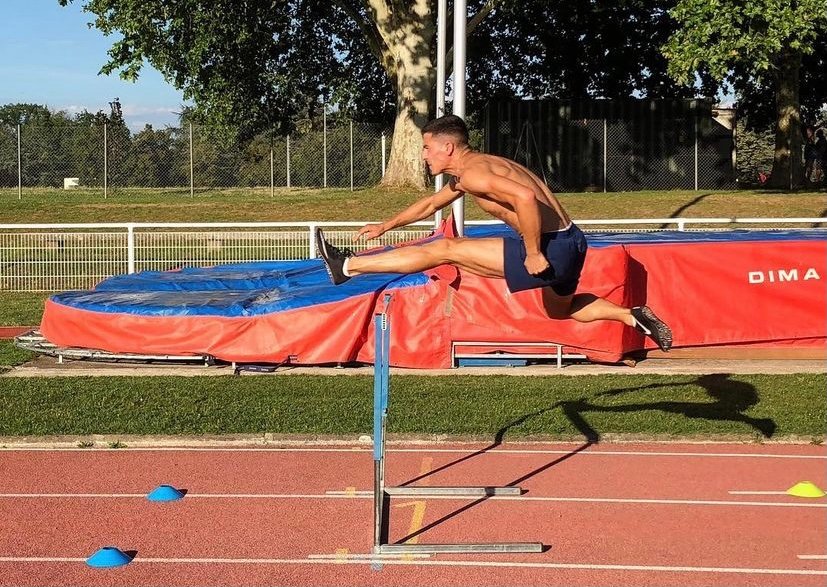Written by Trackandmemes, May 22, 2021
I lived in the south of France until I was 18. Now I'm in Lyon because I'm in my fourth year at INSA (Institut National des Sciences Appliquées), an engineering school that allows me to combine sports and studies. As far as sport is concerned, I started with combined events, then I specialized in hurdles when I was in the junior category. In cadet and junior categories, I was French champion for three consecutive years, and I also made four selections for the French team, including the European championships where I finished 7th in 2017.

What exactly is your discipline?
The hurdle race, 60 meter hurdles indoors and 110 meter hurdles outdoors, is a sprint. The goal is to cover the distance between the starting line and the finish line as quickly as possible. The start is done in the starting blocks, with seven or eight strides to the first hurdle depending on the athlete (editor's note: 1 strides = 1 step). The athlete's morphology (size, power, etc.) will determine whether he or she will take seven or eight strides between the starting blocks and the first hurdle, but an athlete taking eight strides is not particularly worse than an athlete taking seven strides. I'm a small guy with a frequency advantage, so right now I'm fine with eight strides. I wouldn't benefit from doing seven strides right now. It depends on the athlete and his qualities. Then, for the rest of the race, there will be four strides between each hurdle until the finish line.
The 110m hurdles has 10 hurdles, just like the 400m hurdles. Have you ever thought about running the 400m hurdles?
I've tried to run the 400m hurdles before when I was doing combined events. But the 110m hurdles is nothing like the 400m hurdles. These two disciplines require a different effort. And right now, I'm focusing on the short sprint.
In training, do you have to jump higher hurdles to be more comfortable in competition?
It is difficult to put it higher. In general, 1m06, the height of the hurdle in competition, is already the last notch available. So it is difficult to go higher. In reality, it is already high enough. However, to warm up or to do some exercises, I sometimes have to jump lower hurdles.
Does sprinting play an important role in this discipline, or is it the hurdling that takes precedence?
You have to run fast. There is no secret. The 110m hurdles is one of the most technical disciplines in athletics, so we will obviously focus on how we approach the obstacle. But we will always work on the sprint. In technical training, for example, we'll work on the interval between blocks and hurdles, because that's when we create speed. We just try not to lose speed while crossing the hurdles.
And in terms of speed, when is it created? Is it still possible to create it throughout the race, or is it the first steps that are crucial?
It's still a sprint. For example, in the 60m hurdles indoors, if you miss your start, it will be more complicated to catch up. In 110m hurdles, you can catch up more easily, but the speed is mainly created when you leave the starting blocks.
I understand that for many athletes, getting over the first hurdle is sometimes a bane? What about you?
When I was young, I had to be careful to get over the first hurdle. The first hurdle is decisive. Hurdles are all about rhythm. If you miss your first hurdle, it means you're out of rhythm from the beginning. You lose speed and it's hard to get back into the rhythm.
In competition, when you don't make it over the first hurdle, how do you manage the rest of the race so that you don't give up, mentally speaking?
As I practice my discipline, I learn to deal with this kind of situation. Making a mistake can happen at any time. I try to adapt. The more I train, the more natural this adaptation becomes. If I lose the rhythm, I will try to find the music again.
What are your goals for the outdoor season?
To run fast and try to be at my best. To win races again like I did a few years ago.
What would you say to The you from before ? The The you you who, at the time, looked at famous sportsmen hoping to be, one day, this great sportsman?
The previous me performed early. In cadet 2, I won the French championships, I made all the selections in junior. That me was fulfilled and aware that he was living something rare. I didn't take it for granted. My entourage told me that these were precious moments. If I could talk to that old me, I would tell him to enjoy it even more than he did, because afterwards, that me would have a hard time. I would also tell him to pay attention to the people around him, to the STAFF, because the athlete alone can hardly make it. The motivation has always been there. I worked hard, so it should pay off.